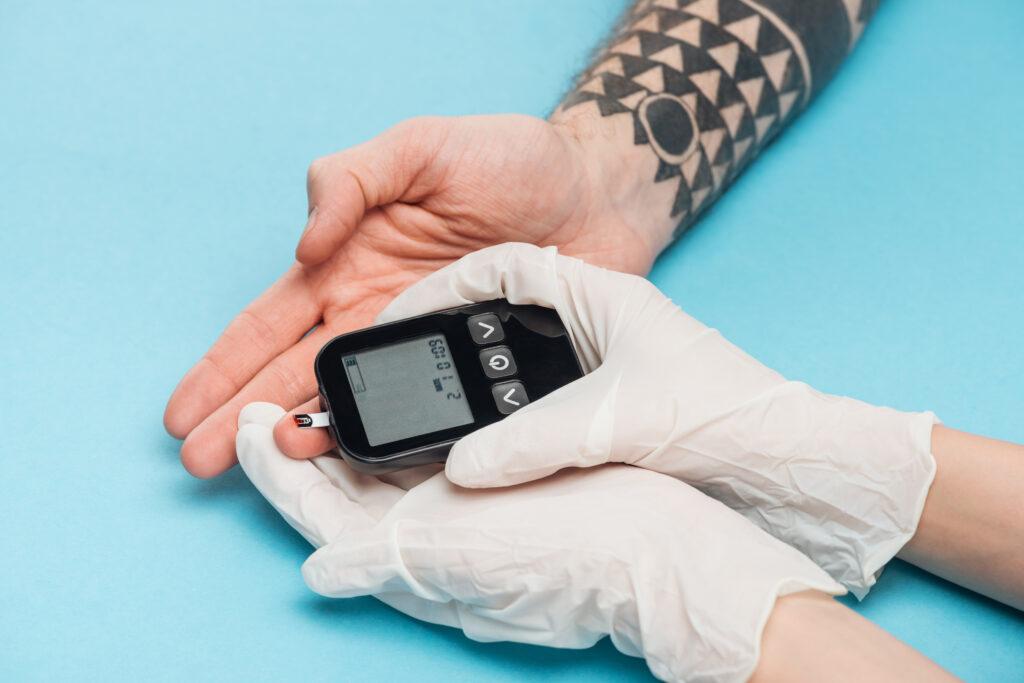Introduction:
Living with diabetes requires a holistic approach that encompasses not only dietary choices but also lifestyle habits. Embracing a balanced and healthy way of living can significantly impact blood sugar levels and overall well-being. In this guide, we will explore a range of strategies to help manage diabetes effectively.

Healthy Eating:
Adopting a balanced diet is fundamental to diabetes management. Prioritize whole foods, including fruits, vegetables, whole grains, and lean proteins. opt for complex carbohydrates with a low glycaemic index to regulate blood sugar levels.
Regular Physical Activity:
Engage in regular exercise to improve insulin sensitivity and lower blood sugar levels. Incorporate a mix of aerobic exercises like walking and swimming, along with strength training, into your routine.
Weight Management:
Maintain a healthy weight through a combination of a balanced diet and regular physical activity. Even a modest weight loss can have a significant impact on blood sugar control.
Stay Hydrated:
Drink plenty of water throughout the day to stay hydrated. Limit the consumption of sugary beverages to avoid unnecessary spikes in blood sugar.
Manage Stress:
Practice stress-reducing techniques such as meditation, deep breathing exercises, or yoga. Chronic stress can adversely affect blood sugar levels.
Adequate Sleep:
Ensure you get sufficient, quality sleep each night. Poor sleep can impact insulin sensitivity and blood sugar levels.
Herbs and Supplements:
Some herbs and supplements, like cinnamon, berberine, and chromium, may have potential benefits for diabetes management. Consult with your healthcare provider before adding supplements to your routine.
Fiber-Rich Foods:
Include fibre-rich foods in your diet, such as whole grains, legumes, and vegetables. Fibre helps regulate blood sugar levels and improves digestive health.
Limit Processed Foods:
Minimize the intake of processed foods, which often contain added sugars and unhealthy fats. opt for whole, unprocessed foods.
Regular Monitoring:
Regularly monitor your blood sugar levels as advised by your healthcare provider. Tracking helps you understand how lifestyle changes impact your diabetes management.

Intermittent Fasting:
Some individuals find benefit from intermittent fasting, but it should be approached with caution and under the guidance of a healthcare professional.
Omega-3 Fatty Acids:
Include sources of omega-3 fatty acids in your diet, such as fatty fish, flaxseeds, and walnuts.
Vinegar:
Some studies suggest that vinegar may improve insulin sensitivity. Consider adding it to salads or diluting it in water.
Green Tea:
Green tea contains antioxidants that may have potential benefits for diabetes management.
Probiotics:
Maintain gut health with probiotic-rich foods like yogurt or consider probiotic supplements.
Cinnamon:
Some studies indicate that cinnamon may help improve insulin sensitivity. Sprinkle it on foods or add it to smoothies.
Magnesium-Rich Foods:
Include magnesium-rich foods like leafy green vegetables, nuts, and seeds in your diet.
Chromium:
Foods like broccoli, grape juice, and whole grains contain chromium, which may influence insulin sensitivity.
Bitter Melon:
Bitter melon is a traditional remedy that may help lower blood sugar levels. It can be consumed as a vegetable or in juice form.
Lifestyle Modification:
Make sustainable lifestyle changes, focusing on long-term habits rather than short-term fixes. Individual responses to these strategies can vary, so it’s crucial to consult with your healthcare provider before making significant changes to your diabetes management plan.

Conclusion:


